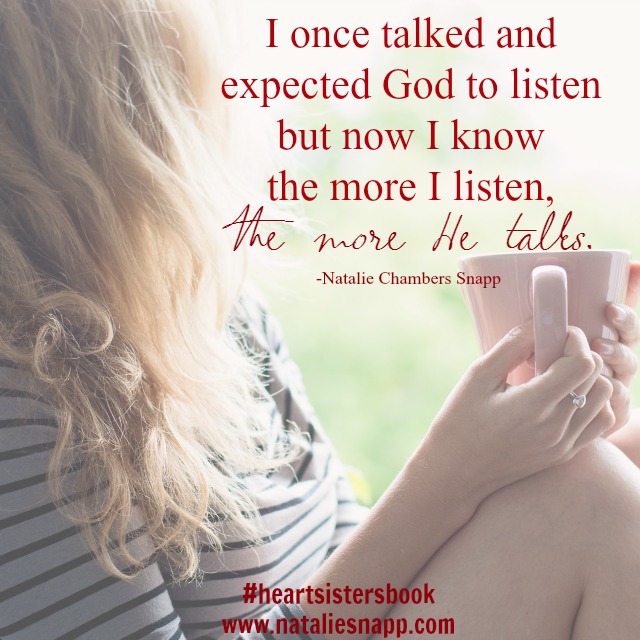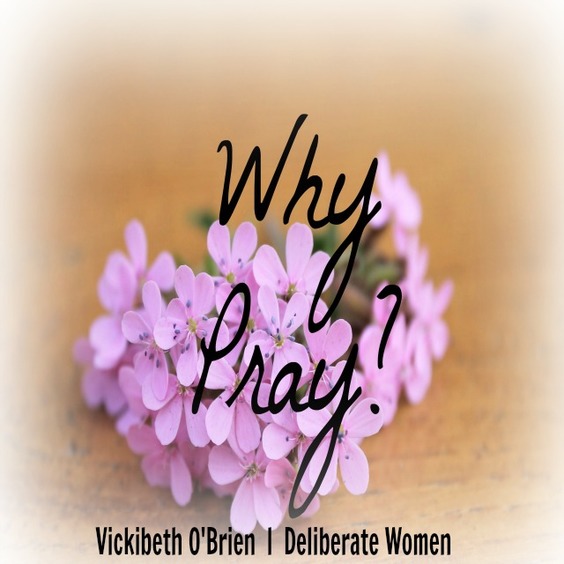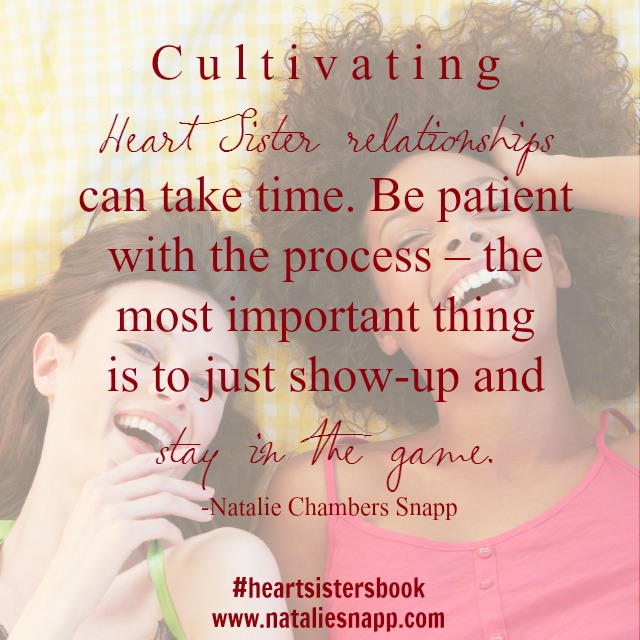 If you are just joining us for the Heart Sisters: Be the Friend You Want to Have Book Club (book by Natalie Chambers Snapp), please click HERE to begin at Chapter One. For many of us, there will come a time when we are called upon to lead. It might be in our church, in our job or in our own family. Regardless of the venue, preparing our hearts for the journey will help better position us for attacks from the enemy, because, like it or not, when we accept a calling to expand the kingdom of God, they will come. In Chapter 9, Natalie shares not only some potential pitfalls in the pursuit and acceptance of leadership, but also how we can use these experiences as genuine learning and growth opportunities for ourselves and the people we lead. She begins the chapter by digging into the story of David – and unlikely leader who was not only successful, but made mistakes. And was faced with critics and those who wanted to keep him from his leadership position. Leadership will never be easy, as we learn from David, but when we keep our eyes focused on God and away from negativity, defeat and the naysayers, we can lead from a place of peace. Natalie goes on to tell us that it’s important to have the right motives when we accept a leadership position. After all, the work will not be easy, so it’s important that our hearts are in the right place. Having been in positions myself where I have led teams, I loved this quote: “Just because you are promoted to a position of leadership, it doesn’t mean you’ve been promoted to perfection.” It’s important that we do not become prideful in our positions. It’s important that we realize that we will still make mistakes (it’s how we react to and learn from them that is key here). And it’s important that we focus more on the overall health of our team than on what we stand to gain. Effective leadership requires humility – recognizing that you don’t have all the answers, but through the combined gifts and talents of your team, your best work will be happen. Effective leadership requires a servant’s heart. We need to look at how we can best provide for our team members, not vice versa. Leadership is not a path for the faint of heart. But for those of us who accept the call, it’s a refining moment and one that not only brings us closer to those that we lead, but also to God. Ready to dig into the questions that Natalie poses with this chapter? 1. What are the qualities of a good leader? 2. Think of the life of David. What were his strengths? What were his weaknesses? How did God use him? 3. Brainstorm ways you can start your leadership team off on the right foot. What are the team’s strengths? Weaknesses? 4. How do you react to your critics? What do you think God wants you to learn from them? 5. Take a moment to dream: what do you desire for the ministry or company you serve? How can you make that happen? Written by Melissa
0 Comments
 If you're just joining us for the Heart Sisters: Be the Friend You Want to Have (by Natalie Chambers Snapp) Book Club, click HERE to begin at Chapter 1. TOMORROW'S HEART SISTERS; Teaching Our Daughters to be Good Friends. Chapter eight opens up with a thought from Natalie that made my knees knock... "...girls learn how to navigate relationships by watching how their mothers navigate their own." (p. 125-126) Did any other mothers of girls just find their heart in their throat? Seriously, what a humbling and terrifying concept to take in, considering navigating relationship is HARD, HARD work! "...we mothers of daughters have the power to guide our girls and show them how to navigate life in the world of women--one girl at a time." (p 127) Natalie poses the question of what kind of girls would we like our daughters to have in their lives. Do we want them to have friends who talk about them behind their backs or do we want them to spend time with girls who are willing to say "I'm sorry" when necessary? I know what I wish for my daughters. I wish for them women who will choose to give them the benefit of the doubt, not offend easily, say I'm sorry when necessary, and--most importantly--point them toward Jesus.
Natalie tells us that we, as mothers, can influence our daughters' decisions when it comes to friends. I believe that and it actually terrifies me a bit. I feel very convicted. I started looking at my own friendships and the drama I have faced, just this week alone. I read Natalie's suggestions on how to get started in being a good role model for our daughters in the way of healthy friendships. Here are her suggestions:
So what do we do should our daughter encounter a "mean girl"? How can we guide our daughters to be the kinds of girls who treat others well and are secure in who they are? And what do we do if/when our daughters encounter a "mean girl"? Natalie offers some practical advice. Our daughter should...
It's hard work, but we must focus on being diligent in training up our daughters to have and maintain healthy relationsships. Natalie closes out this chapter with some thought-provoking questions that will force us to look a little deeper at our own relationships:
Join us Tuesday, June 30, 2015 for Chapter Nine. Written by Mandy.  If you are just joining us for the Heart Sisters: Be the Friend You Want to Have Book Club (book by Natalie Chambers Snapp), please click HERE to begin at Chapter One. Thirty times an hour. The number of times people check their e-mail in our current day society. It seems impossible, but when we really take a step back and think about how accessible smartphones and tablets and other gadgets have made us, it’s not so much a stretch of the imagination any more. How is it that something like technology can consume so much of our lives? In Chapter 7 of her book, Natalie explores both the good and the bad of our technology-enabled world and its impact on relationships. Because “God has wired us to connect and communicate,” responsible use of technology can be such a benefit to our relationships, enabling us to connect quickly and efficiently with friends. It’s also a way to share our faith broadly and boldly, with audiences that we might not otherwise have access to or influence with. But, like all tools (and I love the emphasis that Natalie puts on technology being the “tool” – not the message or the relationship itself), its power rests in the hands of the users. That’s us, sisters. We can use tools like email and texting and Facebook and Twitter to strengthen relationships. But we can use the same tools to tear them down. Like any “good” thing, too much technology can reap negative consequences. Natalie explores three. Technology reduces the amount of time that we spend interacting with those around us. Technology helps us to spread lies more efficiently. Technology can be addictive. But there is a way out. Natalie shares a seven-step acrostic to help us shift the focus of our technology use from behaviors that are addictive and damaging to practices that are supportive and sustaining. It comes by being P.R.E.S.E.N.T. Prioritize. Rest. Ease in. Set boundaries. Explain. Never make others feel guilty. Type away! The chapter ends with practical suggestions for how to navigate technology – what to consider before you use one over the other (for example, email over text) and how to exhibit “behavior-grace” when you are navigating relationships via technology. Let’s explore some of the questions that Natalie poses with this chapter.
Join us Thursday, June 25, 2015 for Chapter 8! Written by Melissa.
 I {Toi} notice that we live in D.I.Y. (Do it yourself) culture where we are encouraged to fix things ourselves. On Social Media and YouTube you'll find all sorts of "life hack" tips, "Top 5 ways" or videos to fix almost anything you can imagine. The D.I.Y approach isn't always the Lord's plan for us. As Christians, our first course of action for any situation should always be to pray, surrendering our problem or situation to the Lord. We should pray His perfect will be done on Earth as it is in Heaven. The next step should be asking the Lord what He wants us to do or not do. Sometimes when you surrender a problem or situation to Him, He may have you hold your peace and remain at rest (Exodus 14:14) so that He may handle it for you. Other times, He may give you a strategy or send reinforcement to help you. In 2 Chronicles 16, King Asa decided on a D.I.Y plan to rely on men instead of God when dealing with enemy armies. King Asa chose to compromise to obtain peace but He strayed from the plan the Lord had given him. 2 Chronicles 16:7-8, the Lord had a prophet, Hanani, rebuke King Asa. Hanani reminded King Asa of a previous battle that the Lord helped him win because Asa relied on the Lord. Then in 2 Chronicles 16:9 NASB he says " For the eyes of the Lord move to and fro throughout the earth that He may strongly support those whose heart is completely His. You have acted foolishly in this. Indeed, from now on you will surely have wars.” In the world's opinion, King Asa's actions seemed wise because it brought peace with little effort. Unfortunately, it was a foolish mistake because King Asa failed to obey and follow the plan the Lord had given him. It's never wise to go against what the Lord is instructing you to do. We should always seek to be obedient to what we know the Lord is instructing each of us to do. We can trust in knowing the Lord's intentions for us is always good and never to harm us. "FOR I KNOW THE PLANS I HAVE FOR YOU," DECLARES THE LORD, "PLANS TO PROSPER YOU AND NOT TO HARM YOU, PLANS TO GIVE YOU HOPE AND A FUTURE." JEREMIAH 29:11 "Our deepest fear is not that we are inadequate. Our deepest fear is that we are powerful beyond measure. It is our light, not our darkness that most frightens us. We ask ourselves, 'Who am I to be brilliant, gorgeous, talented, fabulous?'' Actually, who are you not to be? You are a child of God. Your playing small does not serve the world. There is nothing enlightened about shrinking so that other people won't feel insecure around you. We are all meant to shine, as children do. We were born to make manifest the glory of God that is within us. It's not just in some of us; it's in everyone. And as we let our own light shine, we unconsciously give other people permission to do the same. As we are liberated from our own fear, our presence automatically liberates others." ~Marianne Williamson If you are just joining us for the Heart Sisters: Be the Friend You Want to Have Book Club (book by Natalie Chambers Snapp), please click HERE to begin at Chapter One.
Chapter six of Natalie's book is about setting up boundaries and what boundaries are and are not. It's a meaty chapter that addresses some touchy subjects. Natalie opens by discussing how boundaries are necessary and good for us. For one, we need to set them for ourselves in order to protect our hearts and our families. Boundaries--often looked at as a "dirty" word--are healthy, Natalie shares. And a must for maintaining sanity and for being able to give our families our best. For setting holy boundaries, Natalie suggests the following:
Sometimes, however, we will most likely come across an unhealthy relationship that requires we lay down some ground rules. Natalie shares how to recognize when a relationship necessitates boundaries:
So, now that it's been established that setting boundaries is critical to healthy relationships, Natalie talks about inconsistent boundaries and how they can damage friendships and muddy the waters. For example, having no boundaries at all, not communicating boundaries to others, having inconsistent boundaries, inflexible boundaries, and inappropriate boundaries are all recipes for trouble. To sum up the chapter, Natalie poses the following questions. Take some time to read and reflect on each, seeing how they may apply to you:
Join us next week on Tuesday, June 23, 2015 for Chapter 7.  If you are just joining us for the Heart Sisters: Be the Friend You Want to Have Book Club (book by Natalie Chambers Snapp), please click HERE to begin at Chapter One. Chapter 5 of Natalie ’s book is all about forgiveness. A very suitable follow up for last week's chapter on conflict. In this day and age it is hard to find a person who values forgiving others. We live in a you-get-what-you-give kind of world and even among Christians this mentality is evident. Natalie brings up the parable in Matthew of the man who was forgiven of his debt by the king only to imprison another man for a much smaller debt. Through this story she brings up the very valuable point that Christ makes. If we can not choose to forgive the small stuff here on earth then we cannot and should not expect our Heavenly Father to apply forgiveness to our own lives. I Love this quote from Natalie that really just grasps how much of a foreign concept forgiveness is. "When we forgive the unthinkable, it’s such a foreign concept to the world that the forgiver is often asked to be interviewed and appear in talk shows. It is actually newsworthy to forgive someone of something so heinous in a world that views forgiveness as a weakness. The mother who forgives the drunk driver for killing her child. The father who forgives his daughter’s molester. The woman who forgives her rapist. Incomprehensible, right? Yet these people have discovered that to allow their perpetrator to hold them in chains, they become victims not once, but twice." Forgoveness is almost unfathomable today and yet we as Christians are given a directive to forgive. I think of all of the things that Natalie mentions, I took away 3 main reasons to forgive:
LET’S TAKE A LOOK AT A FEW QUESTIONS THAT NATALIE PROVIDED TO HELP US DIG A LITTLE DEEPER INTO FORGIVENESS. FEEL FREE TO ANSWER IN THE COMMENTS BELOW.
Written by Lindsey.
 Have you ever wondered “why pray?” I {Vickibeth} have. God doesn’t verbally respond. We don’t always see the answer immediately. What’s the point? I began a search to find the answer in His Word. What does the Bible say about prayer and how does that apply to me? This is what I found: It is life changing. Jeremiah 33:3 - Call unto me, and I will answer thee, and shew thee great and mighty things, which thou knowest not. What an incredible promise! God doesn’t say, “pray, and I’ll think about communicating with you.” He says, “I’ve got big things (great and mighty!) to show you.” We receive empty promises from all over our lives; we are disappointed often, but we have a Savior who can’t disappoint! It protects us from sin. Matthew 26:41 - Watch and pray, that ye enter not into temptation: the spirit indeed [is] willing, but the flesh [is] weak. Let’s be honest. Temptations are constantly around us. It often seems like sin is just unavoidable in today’s world, but I would submit to you that it is our lack of communicating with God that causes us to stumble. If our talks with God were a consistent part of our life, it would remove a lot of temptation because we would be viewing our actions through His eyes if our hearts were in tune with Him. It builds our faith. Mark 11:24 - Therefore I say unto you, What things soever ye desire, when ye pray, believe that ye receive [them], and ye shall have [them]. God answers prayer. He isn’t a genie who gives us everything we want, but He always answers. Sometimes with a “no,” sometimes a “yes,” and often with a “not right now,” but He always hears and answers our prayers. As we see God answer our prayers, our faith is strengthened; our trust grows, and we will find ourselves seeking communication with Him more and more because our faith is growing and becoming more real. It is how we communicate with God. Romans 8:26 - Likewise the Spirit also helpeth our infirmities: for we know not what we should pray for as we ought: but the Spirit itself maketh intercession for us with groanings which cannot be uttered. Unlike select believers in the Bible, or those that lived during Christ’s earthly ministry, we cannot physically see or hear from God. Prayer is our communication to Him. The Holy Spirit and reading the Bible is how He communicates back to us. A relationship without communication is really not much of a relationship. I can’t imagine if my honey never spoke to me. We’d have a pretty surface-level, boring marriage. Similarly, our relationship with our Savior is empty without communication. It matters. James 5:16 - Confess [your] faults one to another, and pray one for another, that ye may be healed. The effectual fervent prayer of a righteous man availeth much. I have been guilty of saying, “Well, God knows my thoughts, so I don’t really need to verbalize those thoughts to Him.” Yes, that’s absolutely true, but I “talk to God through thoughts” all day. I can’t pray out loud at work most of the time, but I communicate with Him throughout the day. I’m sure you’ve heard the example many times that a parent often knows what their child needs and wants, but it’s nice to hear the child ask and communicate with the parent. I believe God feels the same way. Yes, he knows what we think, but I believe he delights in hearing us communicate those thoughts to him mentally or verbally. It is commanded. Matthew 6:6 - But thou, when thou prayest, enter into thy closet, and when thou hast shut thy door, pray to thy Father which is in secret; and thy Father which seeth in secret shall reward thee openly. Ephesians 6:18 - Praying always with all prayer and supplication in the Spirit, and watching thereunto with all perseverance and supplication for all saints; 1 Thessalonians 5:17 - Pray without ceasing. This one is pretty self-explanatory! The Bible commands us to pray, and to pray always. While it is a Biblical command, I believe we benefit so much in our relationship with Him when we pray! A constant attitude of prayer is such an important habit to develop! It is personal. Matthew 6:7 - But when ye pray, use not vain repetitions, as the heathen [do]: for they think that they shall be heard for their much speaking. As women we are constantly seeking personal relationships, right? We want to love and feel loved. We desire closeness. Prayer is our personal avenue to develop our relationship with God. Noone else can pray to God for you. This is where many religions today are missing truth. We don’t need a man to intercede to God on our behalf; no, we have the personal opportunity to speak to God on our own, no matter where we are, no matter what we have done. What an incredible gift! Prayer is so important, yet it’s often one of the first things to slip from our daily activity list. I know I needed this reminder of how important prayer is for my life. I’m asking God to bring these truths to my mind again and again. I hope these truth are a reminder to you as well, or maybe this is the first time you have heard some of these verses. Whatever situation you find yourself in today, I hope you will remember that prayer is important and powerful, it’s commanded by God, and it can change your life!  If you're just joining us, we have been discussing Natalie Chambers Snapp's new book Heart Sisters: Be the Friend You Want to Have. Join us HERE for Chapter 1. In Chapter Four, Natalie discusses conflict, that nasty little pest that plagues each and every one of our relationships. God made each of us with a unique outlook on life. Add to that the fact that we live in a sin-filled world and that is what you call a recipe for disaster. Natalie is quick to point out that while conflict will happen in every relationship, conflict resolution is an absolute must. Something that she wrote about this process really struck me. She was talking about the need for Humility in a friendship and in conflict resolution when she stated, “Being humble doesn’t only mean you don’t toot your own horn. It means you accept you will mess up from time to time and might need to apologize for it to boot. It means going to someone in a nonacusatory manner to seek understanding without assuming you have done nothing wrong and being willing to own your part and move toward reconciliation.” Natalie also pointed out that while working in ministry, it was the women who fostered humble attitudes in their relationships that were able to participate in long-lasting Heart Sister friendships. She was also sure to address that not every conflict ends how we might like. Sometimes there will be no reconciliation. We must, however, take note that while reconciliation takes two people, forgiveness and moving forward can occur when just one party chooses to follow the directive God has given us for conflict resolution. We will pursue the concept of forgiveness some more on June 13th as we review Chapter Five. In the mean-time be sure to check out the thought provoking questions below and post your responses in the comments.
 SEEK AND YOU WILL FIND {Purchase your copy of Heart Sisters: Be the Friend You Want to Have HERE.} Natalie begins the chapter with a story of a move from a place where she had friends and support to a place where she was all alone. Before, she had friends who "got" her and lived life with her on an almost daily basis. Now, she was all alone and having to start over. She had a choice to make. "I could plug in or pull out." If she stayed isolated, she would remain isolated. But as we have learned already, God made us to be relational. Eventually, we are going to need friends. If we find ourselves in a situation like Natalie was in, we need to step out in courage and humility and put ourselves in a position to make friends. This might be joining a MOPS group, being a part of the neighborhood Bunco group, or serving in a ministry at church. For those of us who are introverts, this could be more of a challenge, but we still need to do it. In this chapter, Natalie suggests 7 types of friends we should consider including our lives. She calls them the Super Seven Sisters. 1. Rahab - Bold / Speaks up when you can't 2. Mary - Trustworthy and a prayer warrior 3. Deborah - Wise and a strong leader 4. Naomi - Older and more spiritually mature / a mentor 5. Ruth - Loyal and unwavering 6. Bathsheba - Has a balance of truth and grace in the hard times 7. Elizabeth - The encourager In addition, she added that we may have different groups of friends - online, real-life, "Narrow Path", mentor/mentee, and ministry friends. We can have a variety of friends from different groups, but we need to be careful with the online group. While it is perfectly fine to have online friends, we need to make sure that there are real-life friends we can go to for wisdom, support, and love. That is encouragement especially for us introverts because we can so easily hide behind our computers and be comfortable there. "We don't ever grow if we stay where it is easy and comfortable, do we?" Finally, Natalie encourages us at the end of the chapter to "stay in the game." Heart sister relationships don't happen overnight, and we will need patience as our relationships grow. We need to be encouraged to stay the course, choose our relationships over conflict, forgive, love, and be the friend we want to have. Join us here again Tuesday, June 11th, 2015 for chapter four! Written by Ginny.
 Today’s devotional is going to come form 1 Samuel 3. To begin this story, first we need to know a little bit about Samuel. This young man was promised by his mama to be a part of God’s ministry from before his conception. He was taken to the temple and he served there from the time he was very young. There was never any doubt in his mind, or his mother’s that Samuel was destined for ministry. Let that sink in. Ministry minded just took on a whole new meaning. How effective would our children be in ministry if we committed their lives to God and His ministry before they were even conceived within our wombs? Now lets read from His word. 1 Samuel 3:1-10 Meanwhile, the boy Samuel served the Lord by assisting Eli. Now in those days messages from the Lord were very rare, and visions were quite uncommon. One night Eli, who was almost blind by now, had gone to bed. The lamp of God had not yet gone out, and Samuel was sleeping in the Tabernacle near the Ark of God. Suddenly the Lord called out, “Samuel!” “Yes?” Samuel replied. “What is it?” He got up and ran to Eli. “Here I am. Did you call me?” “I didn’t call you,” Eli replied. “Go back to bed.” So he did. Then the Lord called out again, “Samuel!” Again Samuel got up and went to Eli. “Here I am. Did you call me?” “I didn’t call you, my son,” Eli said. “Go back to bed.” Samuel did not yet know the Lord because he had never had a message from the Lord before. So the Lord called a third time, and once more Samuel got up and went to Eli. “Here I am. Did you call me?” Then Eli realized it was the Lord who was calling the boy. So he said to Samuel, “Go and lie down again, and if someone calls again, say, ‘Speak, Lord, your servant is listening.’” So Samuel went back to bed. And the Lord came and called as before, “Samuel! Samuel!” And Samuel replied, “Speak, your servant is listening.” First, we know that Samuel’s parents, specifically his mother committed him to the Lord before conception and in these verses we can see that Samuel’s mentor Eli realizes what Samuel is experiencing and directs him to respond plainly and submissively with the phrase “Speak, Lord, your servant is listening.” Samuel then immediately does what Eli instructed. He goes back to bed and when the Lord calls again Samuel is able to recognize His voice and is quick to respond that he is listening. Listening can be defined as “to take heed, pay attention” with one of its synonyms being to obey. Samuel never once questioned the purpose God had for him because all those who were important in his life had been directing him to Listen for and to heed the directions of God. He started out life knowing that he was destined and made to serve God and because of his willingness God chose him to be a voice for the Lord. Let’s begin to look out our children’s lives as anointed and predestined vessels for great and abundant ministry. Father God, help us to begin envisioning our children in ministry. So much of who they are and who they become starts at home with the encouragement we give them. Help us to encourage them to focus on things eternal, help us to prepare them to hear your voice and to answer your call with a quick and obedient response Lord. Guide us as we guide them. In your precious name Father God, Amen. |
FREE Download!Archives
October 2017
|
© 2020 She Heard/Mandy Pagano. All Rights Reserved.
She Heard/Mandy Pagano makes no representations or warranties in relation to this website or the information and materials provided therein, and will not be liable to you in relation to the contents of or use of this website for any indirect, special or consequential loss. Nothing on this website constitutes or is meant to constitute advice of any kind. If you require advice in relation to any legal, financial, medical or psychological matter, you should consult an appropriate professional.
DALLAS, TEXAS
She Heard/Mandy Pagano makes no representations or warranties in relation to this website or the information and materials provided therein, and will not be liable to you in relation to the contents of or use of this website for any indirect, special or consequential loss. Nothing on this website constitutes or is meant to constitute advice of any kind. If you require advice in relation to any legal, financial, medical or psychological matter, you should consult an appropriate professional.
DALLAS, TEXAS



 RSS Feed
RSS Feed